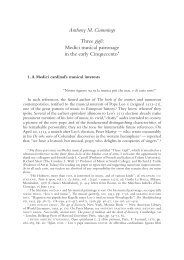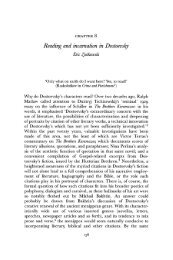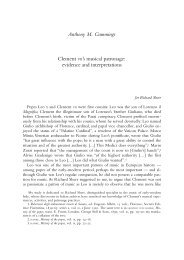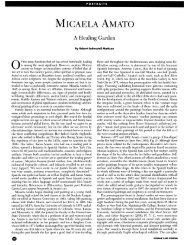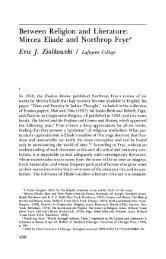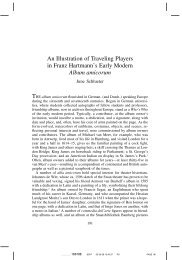courses of instruction - Lafayette College
courses of instruction - Lafayette College
courses of instruction - Lafayette College
Create successful ePaper yourself
Turn your PDF publications into a flip-book with our unique Google optimized e-Paper software.
GOVERNMENT AND LAW<br />
subfields), a subfield (concentration) minor<br />
(one introductory course and five other<br />
<strong>courses</strong> in a subfield), or a thematic minor.<br />
A student who wants to pursue a thematic<br />
minor must submit to the Department<br />
Head a statement explaining the rationale<br />
and the plan behind his/her idea.<br />
INTRODUCTORY COURSES<br />
101. Introduction to United States Poli<br />
tics. An examination <strong>of</strong> the American po<br />
litical system, its institutions and process<br />
es. Topics studied include political behav<br />
ior, the Constitution, the Congress, the<br />
Presidency, the courts, and current foreign<br />
and domestic issues. Recommended to<br />
students who have not had an adequate<br />
secondary school preparation in American<br />
government. Mr. Kincaid, Mr. Lennertz,<br />
Mr. Murphy, Mr. Shea, Ms. Silverstein<br />
102. Introduction to International Poli<br />
tics. This course reviews the main issues<br />
and problems confronted by the interna<br />
tional system and the literature devoted to<br />
them. The course deals with phenomena<br />
such as peace and war, integration and<br />
disintegration, economic and military as<br />
sistance, formulation and execution <strong>of</strong> for<br />
eign policy. Special emphasis is placed on<br />
stability and change in the global system.<br />
Mr. Englehart, Ms. Harrison, Mr. Peleg<br />
103. Introduction to Comparative Poli<br />
tics. A survey <strong>of</strong> governments and politics<br />
in the industrialized and Third World<br />
countries. The course examines the ques<br />
tion <strong>of</strong> what it means to compare political<br />
systems and explores the historical setting,<br />
nature <strong>of</strong> political participation, political<br />
values, governmental structures, and po<br />
litical performance <strong>of</strong> selected countries in<br />
Western Europe, Asia, the Middle East,<br />
Africa, Latin America. Mr. Englehart,<br />
Mr. McCartney<br />
104. Introduction to Political Theory.<br />
This course introduces students to several<br />
<strong>of</strong> the most important thinkers and<br />
themes in the tradition <strong>of</strong> political theory.<br />
The topics and texts <strong>of</strong> the course will<br />
vary, but students can expect to confront<br />
126<br />
such issues as justice, equality, and power,<br />
and to read both classic and contemporary<br />
authors. Mr. Miller, Ms. Silverstein<br />
UNITED STATES GOVERNMENT<br />
AND POLITICS<br />
204. Gender and the Law. This course ad<br />
dresses the role <strong>of</strong> gender in the U.S. legal<br />
system. The course explores the impact <strong>of</strong> the<br />
constitution and legislation on gender-based<br />
issues such as employment, discrimination<br />
(including gender-based affirmative action),<br />
equal pay, sexual harassment, educational<br />
opportunity, reproductive rights, family<br />
leave, and child custody. Ms. Muhlfelder<br />
207. Black Politics in the United States. A<br />
study <strong>of</strong> the changing situation <strong>of</strong> Blacks in<br />
U.S. politics since the 1950s. Some ways in<br />
which Congress, the Presidency, the Su<br />
preme Court, the bureaucracy, and local<br />
governments have affected Blacks and oth<br />
er minorities. Analysis <strong>of</strong> Black experiences<br />
in American politics in light <strong>of</strong> constitution<br />
al theory and the everyday operation <strong>of</strong> po<br />
litical institutions and processes. Specific<br />
problems related to racism and socioeco-<br />
nomic status. Mr. McCartney<br />
211. State and Local Government and<br />
Politics. Examines what state and local<br />
governments do and why. Topics include<br />
state constitutions; state legislative, execu<br />
tive, and judicial processes and policymak-<br />
ing; state and local budgets, taxes, and<br />
spending; county, municipal, special-dis<br />
trict, and school-district governments and<br />
services; state and local parties, elections,<br />
interest groups, and media; intergovern<br />
mental relations; Native American tribes,<br />
homeowner associations, and associated<br />
states; and selected policy issues such as<br />
civil rights, crime, business and economics,<br />
health care, and environmental protection.<br />
[W] Mr. Kincaid<br />
213. Law and Society. Investigation <strong>of</strong> the<br />
dynamics <strong>of</strong> the legal process in the regu<br />
lation <strong>of</strong> social conflict, change, and con<br />
trol. Topics include philosophical sources;<br />
the administration <strong>of</strong> criminal and civil<br />
justice; and litigation as politics. [W]<br />
Mr. Lennertz, Ms. Silverstein




